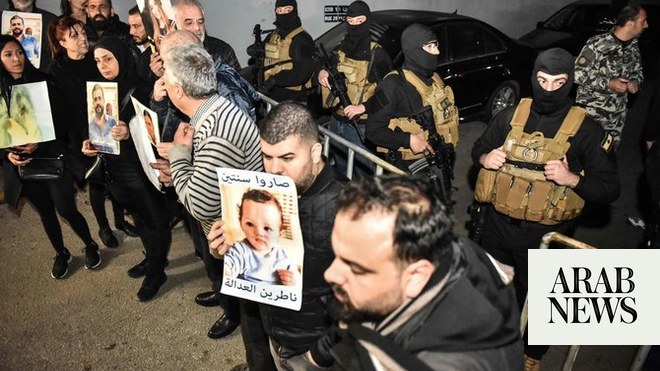
BEIRUT: Lebanese President Michel Aoun has asked Russian ambassador Alexander Rudakov to provide satellite images of Beirut from Aug. 4, 2020, when a huge explosion rocked the city’s port, according to a Lebanese presidency tweet on Friday.
The massive explosion occurred when around 2,750 tons of ammonium nitrate — which had been stored at the port since 2014 — and quantities of explosives ignited. The resulting blast killed more than 215 people, injured thousands and destroyed swathes of the Lebanese capital.
Russian President Vladimir Putin said a week ago: “I would like to once again offer my condolences to the Lebanese people ... Many years ago, ammonium nitrate was delivered to and stored in the port; the local authorities did not give it the attention it needed, although, as far as I know, they wanted to sell it profitably.”
Putin added: “As for helping with the investigation, frankly speaking, I do not understand how satellite images can help, and whether we even have any. However, I promise that I will make inquiries, and if we do have anything and can provide assistance to the investigation, we will do so.”
After the explosion last year, Aoun told the press: “There are two possibilities; the explosion occurred either as a result of negligence or external interference by means of a missile or a bomb.”
In October 2020, then-Prime Minister Hassan Diab said he asked French President Emmanuel Macron for satellite images of the port before, during and after the explosion, and that he had sent a similar request to Italy. Neither country has yet publicly confirmed their intention to provide such images to Lebanon.
The lead investigator of the probe into the explosion, Judge Tarek Bitar, is expected to issue his rulings early next year, a judicial source told Arab News.
However, the probe into what was one of history’s largest non-nuclear explosions is stalling amid a smear campaign against Bitar and pushback from powerful political factions.
Bitar has so far accused 10 officials, officers, and judges of being in part culpable for the explosion, including Diab; two MPs from the Amal movement (Hezbollah’s ally) Ali Hassan Khalil and Ghazi Zeaiter; MP Nohad Machnouk; former minister Youssef Finianos; Director General of State Security Maj. Gen. Tony Saliba; his counterpart at General Security Maj. Gen. Abbas Ibrahim; and former army commander Gen. Jean Kahwaji.
Hezbollah has accused Bitar of politicizing the investigation, and several of the politicians accused of negligence and causing the death of hundreds and injury of thousands have refused to appear before Bitar when summoned for questioning.
The latest of those is Zeaiter, who failed to appear for his scheduled interview with Bitar on Friday.
On Aug. 25, Bitar supervised a simulation of the welding that preceded the explosion in the port warehouse. The simulation was attended by several lawyers representing the parties concerned and a number of security and judicial officials. The Meteorological Department was also present to provide advice about the weather conditions on the day the explosion occurred.
French and American officials were also involved in the investigations, the results of which remain confidential.
The families of the victims and those affected by the explosion have been increasingly vocal about their dissatisfaction with the fact that, more than one year after the blast, no senior official has yet been held accountable for the country’s worst peace-time disaster.












